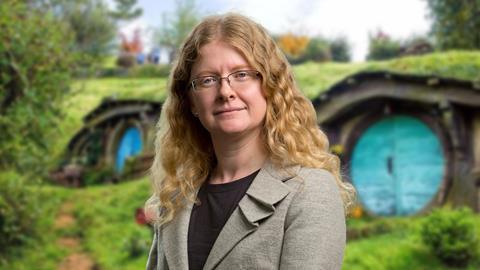Holly Ordway’s move from atheism to Christianity is reminiscent of CS Lewis’ conversion. Here, apologist Joel Furches tells her story and explores why she believes women play a crucial role in apologetics
When a hardened atheist considers the evidence and converts to Christianity, it inspires Christians and challenges atheists. Holly Ordway’s is just such a story. You can hear more from Holly on The CS Lewis Podcast here.
Read more:
Overcoming sexism, societal expectation and vicious online attacks
Adrienne Johnson’s unlikely conversion to Christianity
From pregnant teen to singing apologist
Why I changed my mind on women ordination
Not God’s type
Some atheists are convinced when studying the marvellous complexities of science. Some are convinced by historical evidence for Christ. The evidence that Holly discovered, however, was a little more exceptional. Holly explains:
“It was through reading Christian poetry and works like Tolkien’s The Lord of the Rings that I got a glimpse of a richer, more meaningful world; it was through my imagination that God called me to him, and got me interested in asking the questions that ultimately led me to discover that Christianity is true.”
Holly now sits as the chair of the Department of Apologetics and director of the MA in apologetics at Houston Christian University. She describes herself as a “teacher of teachers”, equipping the next generation of apologists for the Christian worldview.
Holly has integrated her inspiration through imagination into the work she does. She says:
“…my specialty is literary and imaginative apologetics and I have published books on that topic. I also write on CS Lewis and the Inklings. My apologetics work includes an element of engagement with broader popular audiences. I am a published poet and have written a memoir of my conversion to Christianity and my later reception into the Catholic Church in Not God’s Type: An Atheist Academic Lays Down Her Arms.
The power of prose
While Holly is a renowned and accomplished apologist, rubbing shoulders with the likes of Dr Michael Ward, Dr John Mark Reynolds, Dr Michael Licona and Mary Jo Sharp, Holly’s distinctive focus on the world of the imagination as evidence for a creator has become a unique niche in the marketplace of ideas.
“The fact that I have an analytical mind, yet I am also a poet, makes for a particularly useful combination for the kind of work I’m doing in apologetics. My academic background (a PhD in English Literature) allows me to integrate literature into the work of apologetics.”
Women in apologetics
Holly’s accomplishments have not been without their challenges. As a woman in a male-dominated field, Holly admits that she sees a variety of obstacles for women who might aspire to follow in her footsteps:
“Unfortunately there’s still a bias against women intellectuals in our culture (not just in Christian communities!) so that women who are educated or interested in learning are accused of being ‘unfeminine’ or ‘too smart’. This is one reason why it’s so important for women to see role models in apologetics.
“There are other challenges. Some churches don’t allow women to teach, or only to teach young children or other women, which means that women aren’t allowed to fully contribute to the equipping of the body of Christ. I feel like I can be a good role model here: as a Catholic I believe in a male-only priesthood, and in male headship in the family, and so I fully accept that women have a different role in the Church than men. In fact, as a matter of personal conscience, I won’t accept speaking offers for Sunday messages, even in Evangelical churches; it feels too much like stepping into the pastor’s role for me to be comfortable with that.
“Yet, I teach both men and women, and as head of Houston Christian University’s apologetics department, I am a leader of both men and women. I hope this shows in practical terms that women can be leaders and teachers without necessarily being egalitarian in theology.
Get access to exclusive bonus content & updates: register & sign up to the Premier Unbelievable? newsletter!
“Another challenge for women apologists is that the culture of apologetics is still very male-oriented. It’s hard to be the only woman in a graduate class. (I’m pleased to say that our enrollment in MA in apologetics is roughly 50/50 on men and women students.) Women can feel isolated. In practical terms, at apologetics events, there is seldom child-care available, and young children are usually not welcome in the events. We need to be more welcoming of families with children.”
If these challenges can be overcome, however, Holly speculates that the field of Christian apologetics will be greatly enriched by an influx of women willing to take up this calling:
“Women often have different styles of relating to others, and we need to make more use of a wider range of approaches. Apologetics has tended to be very head-focused and debate-oriented, such that it’s described in terms of ‘winning arguments’ and ‘defeating atheists’ and so on. There’s a place for that, but it shouldn’t be the only or even the main approach to apologetics; it turns a lot of people off (men as well as women). Women apologists can help diversify the ways that we share the truth, so that apologetics includes non-confrontational discussions, questioning and dialogue, and creative expression. This will also help encourage men who don’t like the ‘argument’ style, that they have a place in apologetics too!
“Women who are mothers also have a unique and very important role in apologetics, as they are their children’s first teachers. The family is the first church! Stronger families, with mothers, fathers and children who know what they believe and why, will help strengthen the Church and help us to reach out to others with confidence and love.”
To hear Holly Ordway on The CS Lewis Podcast, listen here.
Joel Furches is an apologist, journalist and researcher on conversion and deconversion, based in the USA.























